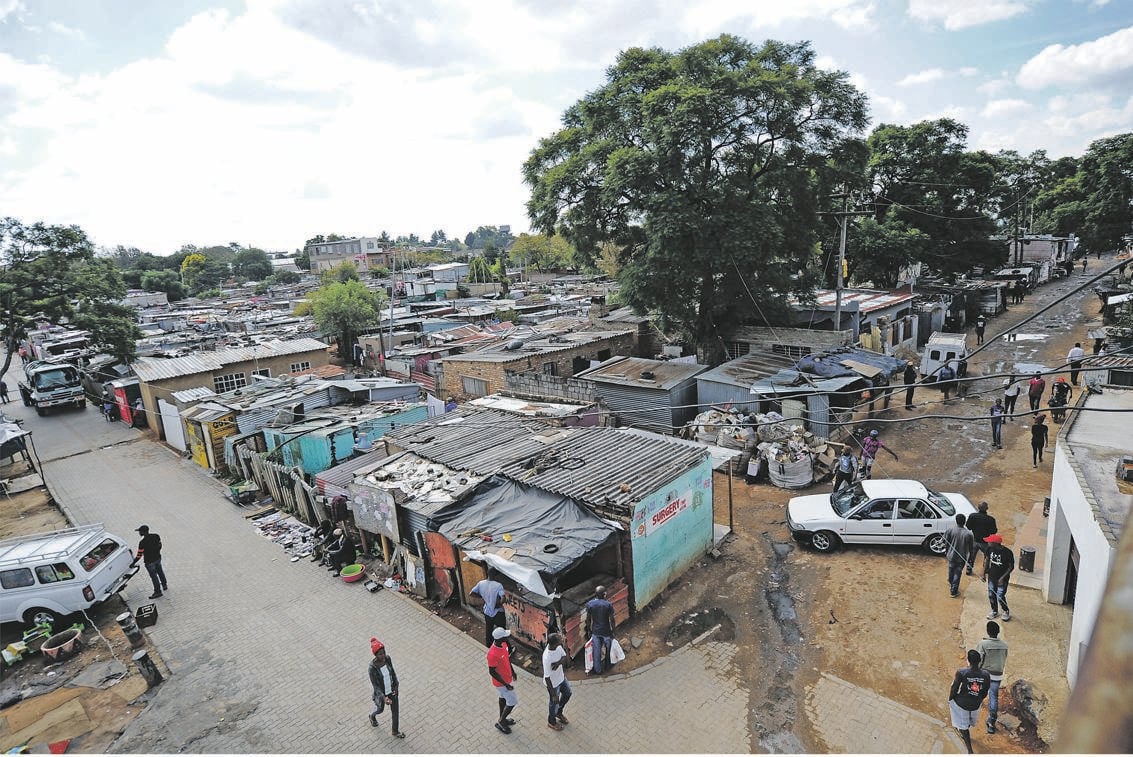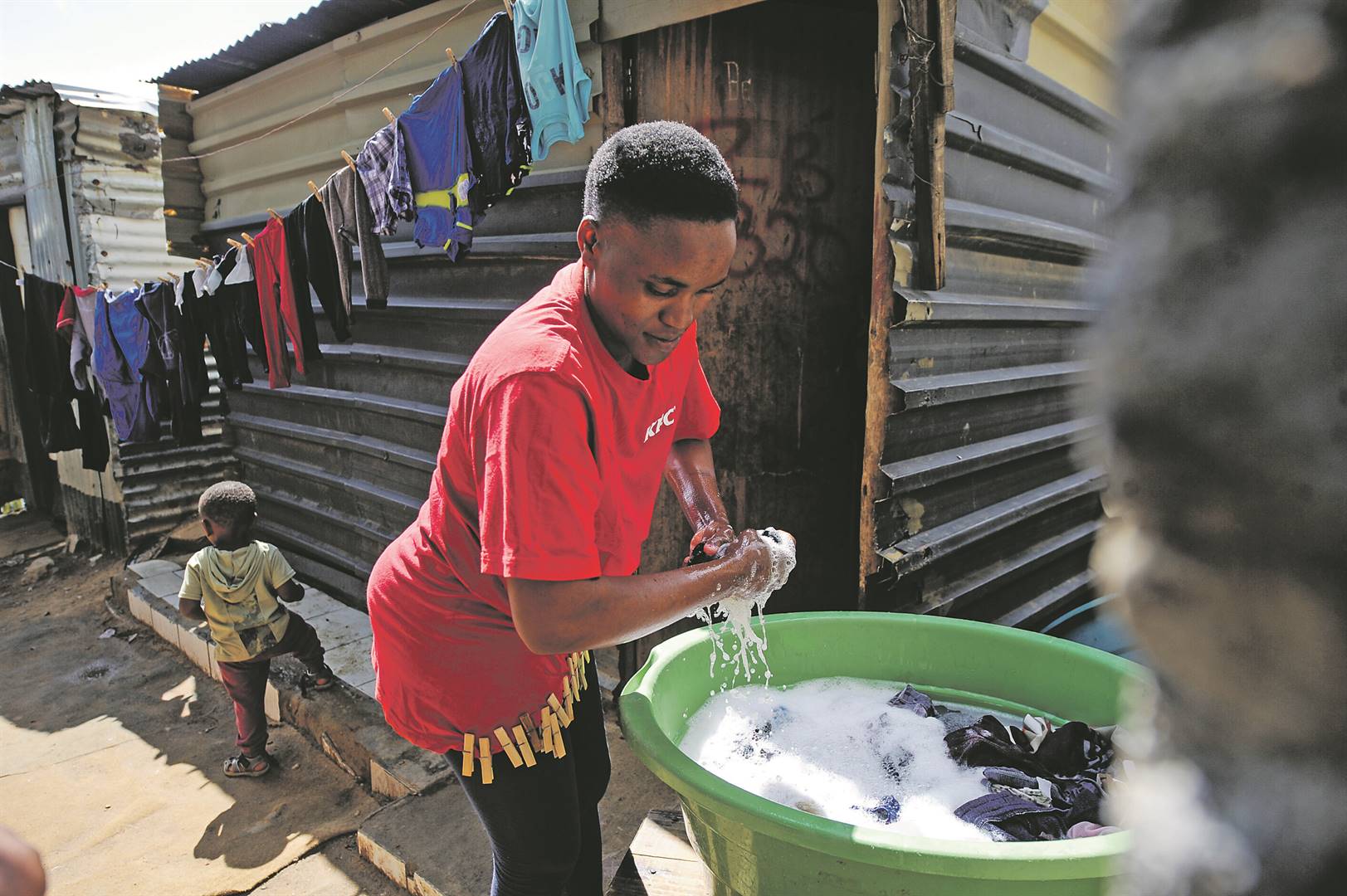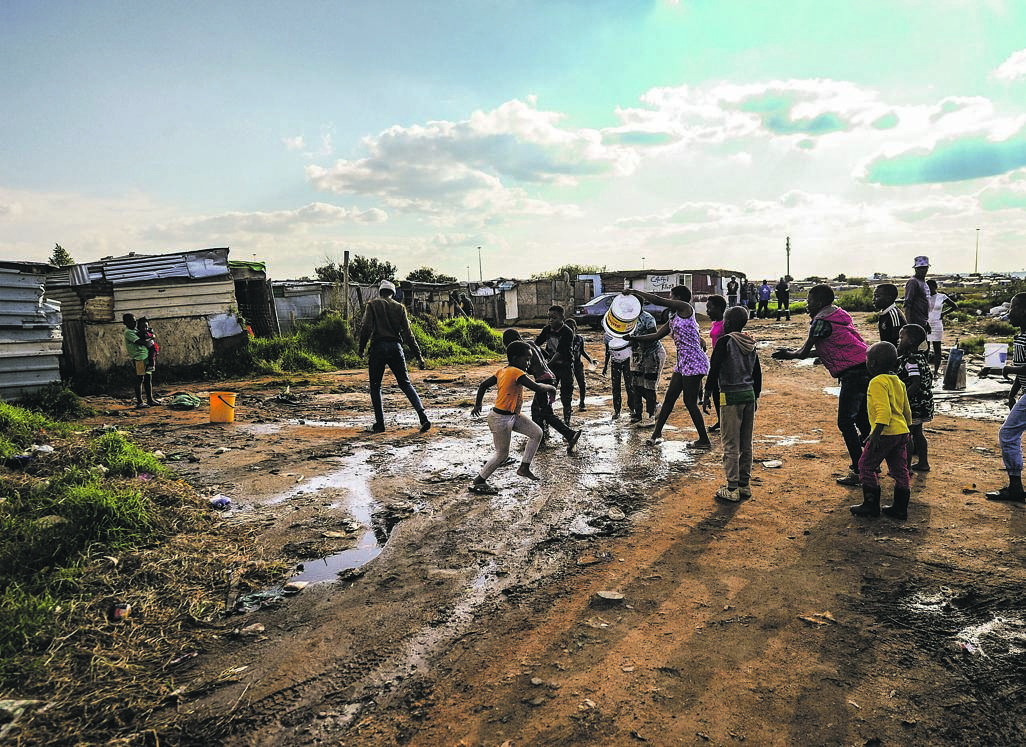
In northwest Johannesburg, in the Zandspruit informal settlement, the dusty streets are abuzz with conversation, blaring music and the sound of laughter from children keeping themselves entertained with games including skipping and hide-and-seek.
Community members flock to a bakkie filled to the brim with tomatoes for sale. Men, women and children rush over to make a purchase for their respective households.
The lockdown doesn’t seem to have taken effect in KwaJack, as residents of the area fondly call it.
A police van approaches and the officer gestures to the bakkie, saying loudly: “Who owns this?”
A customer points out a man, the only one wearing a face mask.
Without hesitation, he approaches the police van and presents the officer with a permit, which allows him to operate.
The van slowly moves on and out of the area.
In a distant corner stands another vendor, whose offerings include cellphone chargers and multipurpose cables. There is no face mask in sight.
“Cables, cables, chargers, chargers!” he screams in an effort to get the attention of the more than 100 people who fill the rocky unpaved “road”.
It’s a busy day.
From a distance it looks like it’s life as usual in the community in the midst of the Covid-19 coronavirus pandemic and nationwide lockdown.
But a closer look reveals the fundamental impossibilities and struggles of some communities, including this one, owing to the socioeconomic realities they face.
Down the street, a group of six men are in conversation about “our situation”.
Among them is husband and father of three Dallas Zulu, who says “all we see are police coming here wearing masks telling us to go into our houses and to distance ourselves from each other, instead of healthcare professionals who can educate us about this coronavirus thing”.
Those around him listen attentively, nodding their heads.
“We are told to social distance and stay 2 metres away from each other, but our shacks are right on top of each other; literally attached.”
Since news of Covid-19 hit Zandspruit, Zulu says information has not been forthcoming.
Residents are unsure about what to do and what not to do when it comes to the virus, and have no access to masks and gloves.
“We need people who can teach us, not police who will just shout and scream at us. How are police more important than teaching us what to do and how exactly to keep safe?” he asks.
“A person in this area is more isolated when on the street than when indoors because we are all crammed into one shack. With more than five of us in a shack, how is 1m or 2ms apart possible? Even if we want to isolate … how [can we do so]?”
The 36-year-old, who usually makes a living through “piece jobs such as painting or gardening”, says he has lost his income and is now seeking new ways to make money.
“We are not out on these streets because it is all fun and games, my sister, but we are a community … we know each other…
“I am standing here with amajita [the boys] because by me being out here I will meet a friend who might help me with money to buy bread or something I need. As a man, staying indoors is not an option, especially when there are more than five of us in the shack.
“Someone might have an idea of something we could do to be able to sustain ourselves during this time,” Zulu says.
Mother of four Carol Selepe is six months pregnant.
“Today is laundry day,” she says, as she squeezes water from a T-shirt she has just rinsed.
Selepe says although she has “tried this lockdown thing, it is impossible to avoid people”.
“I am doing laundry right now. For me to get water, I must walk a bit of a distance in these tiny congested passages, where I will definitely bump into different people,” she adds as she picks up another item of clothing.
“I then get to the tap that we all share ... all of us, more than 100 of us on this side. So please tell me how this is supposed to work for us?”
Selepe’s concerns don’t end there. As a mother sharing a shack with four children, the eldest of whom is a 13-year-old boy, she faces the uncomfortable issue of having to “ask my children to go outside when I need to bath”.
“What else can I do?” she asks with a shrug.
“I can’t bath in front of him. And obviously children will not just sit at the door step and wait, they will go and walk around and will more than likely find their friends and end up roaming the streets.
“That is our life. People look at us and think we are idiots who are just living life as usual. We are [living this way] because the struggles we are facing do not disappear just because of corona. We still live in shacks that are adjoined and that we share with four or more people; we still have one tap we all have to share as a community and we cannot run away from that.”
Her neighbour, Thulani Mosiamedi, slowly unlocks the door to his shack, which he shares with his friend and, like Selepe, says “we also have to go out when the other has to bath”.
“We sleep here, we cook here, we bath here in this shack,” he says as he shows the inside of the room.
In the streets, which were abuzz with activity, commotion erupts as residents scatter in an effort to get away from the approaching Honeydew Community Police Forum.
Carrying sjamboks, members of the forum instruct residents to go into their respective shacks.
Although bound by his duty to ensure that community members adhere to the rules and regulations of the lockdown, forum head of security Kenneth Lekalakala says: “There are too many people on the streets. We are trying to get them to comply because of the conditions under which they live. These people don’t have yards or anything. They try but they can’t manage.
“It is congested, and we are aware that as soon as we leave they will be out and about again,” a notion which proved true a mere 15 minutes after the forum had vacated the area and the streets were filled with residents again.
The sentiment of the residents of Zandspruit is shared by those on the other side of the city, at Madela 2 Informal Settlement in Tembisa.
The East Rand settlement is not short of a sense of life as children, friends and neighbours gather in their various groups, simply chatting, with children playing house while men, young and old, play a game of cards or draughts.
Standing at the communal tap are neighbours Nontembiso Juqu and Siphokazi Ndevu, who, like Zulu and his friends, are discussing “the lack of assistance from government during this time”.
To the left of where the two stand are portable communal toilets, of which, Ndevu says “one could be shared by up to seven families”.
“They are locked and about seven of us each have a key to one, which we all share. This is my key,” she says as she presents it.
“So, seven other families here have the same key and that is the case with each of the toilets here.”
Echoing Selepe’s statement, Ndevu adds: “I live on the other side and to get to the toilet and the tap I must walk a distance. How am I supposed to avoid people through these passages, which themselves are not even 2ms wide?” she asks.
“People are hungry and they cannot be expected to be in their shacks all day,” she says as she points to one.
Fellow resident Lucky Dhlomo (50) joins the conversation and says that, unlike in Zandspruit, “we have not had police, let alone healthcare workers, come to our area”.
“It’s as if we do not exist. Yes, we are scared of the virus because, according to me, it is worse than Aids, but government cannot make rules and only consider people who are living lavishly in proper houses in the suburbs and then say we are living life as usual when they do not even seem to care to address the issues we are facing, which make it difficult for us to keep social distance or isolate when seven of us are crammed into one shack.”
Although no cases have been reported in either Zandspruit or Madela 2, densely populated areas, most of them informal settlements, are a priority for screening and testing, says the health department.
TALK TO US
Do you or anyone you know live in an informal settlement? Are you able to do social distancing?
SMS us on 35697 using the keyword DISTANCE and tell us what you think. Please include your name and province. SMSes cost R1.50. By participating, you agree to receive occasional marketing material
 |
| ||||||||||||
| |||||||||||||




 Publications
Publications
 Partners
Partners










